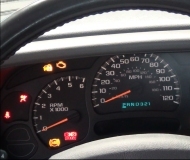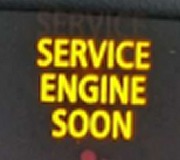Think of the fat battery cable going to the starter as a garden hose. If you step on the hose and partially kink it, the water will just dribble out the end. That water won't have enough power to do anything. Also, if you unscrew the nozzle, the water will run wide open but won't be able to build any pressure either, so it won't have the power to do anything. A corroded cable is like standing on the hose. You can't get enough current through it to run the starter motor. When you try to run water current through the restriction in the hose, you lose all the pressure. When you try to energize the starter, it draws so much current that the voltage drops. Voltage is electrical pressure. When the voltage drops enough, other things that are turned on are also affected. In this case you see the results of low voltage when the interior lights get dim, but the starter solenoid is also affected. There's actually three switches involved with the starter. The last one is that solenoid which also does mechanical work. Because of the low voltage, the spring-loaded solenoid doesn't have enough power to stay engaged, so it releases. When it does, it turns off the very high-current switch to the starter. If you turn off the faucet feeding the hose, standing on the hose has no effect on anything. When the solenoid turns off, that high current to the starter stops trying to flow. As a result, voltage goes back up. That higher voltage is what the solenoid needs to engage, so that's what it does, then the process repeats again. That solenoid typically turns on and off multiple times per second, and the lights will flicker in time.
You can expect the same results when you bypass the starter relay. We're just doing that test to verify it's a starter circuit problem and that we don't overlook something unusual. The ignition switch can not handle much current without overheating. It passes a fraction of an amp to run the starter relay. The contacts in that relay can only handle about 15 - 20 amps, but that's enough to run the solenoid built into the starter motor. When the solenoid engages, it first runs a small gear into mesh with a ring gear, then it turns on a high-current contact to pass about 150 - 200 amps to the starter motor. You have to have really beefy cables and solid and clean connections to pass that much current.
Excessive resistance anywhere in that circuit can cause a buzzing noise from the train of events I described, but besides bad connections, corroded cables, and the rare shorted starter, a bad battery will do the sane thing. You can find that by measuring its voltage while under load. It's hard to do that when running the starter because that voltage will be pulsing, but you may be able to determine the battery's condition by turning on the head lights and heater fan. A good battery that's fully-charged will read 12.6 volts. Without going into a lot of unrelated details, if the battery has a shorted cell, you'll find it's around 11 volts.
The sound in your video does not sound like the normal buzzing caused by any of the things I listed. That's why you should bypass the starter relay and verify the same noise occurs. By leaving the ignition switch off, nothing else will be trying to run.
Saturday, November 9th, 2013 AT 12:49 AM





